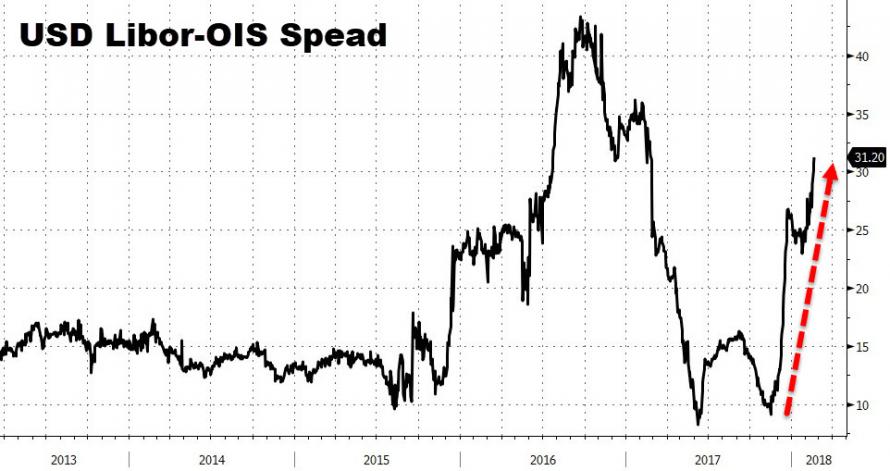While trader attentions have been focused on more conventional risk indicators like equities, yields and bonds spreads in the aftermath of the February VIX eruption, a less followed – if perhaps far more informative indicator – the USD Libor-OIS spread has been blowing up, widening to 32.7bp – the most since last Feb. 22 – as Libor sets higher for the 11th straight session, while commercial paper rates for financials are also rising as more issuers have been selling longer-dated obligations, and moving closer on the curve.

So is there another dollar shortage quietly forming behind the scenes?
As it turns out, the answer may be yes, and the culprit is the same “echo taper” discussed here last year (and recently by Credit Suisse’s Zoltan Pozsar) , when we commented on the impact repatriation would have on rates, and especially the front-end.
Overnight, Bank of America reminds us that one of the biggest stories of 2018 for high grade credit is overseas cash repatriation as part of tax reform.
It is such a simple – yet powerful – story. During the ongoing 4Q earnings season we have now heard from most of the largest holders of overseas cash.Although specific plans are obviously “work in progress” some clear patterns have emerged.
Among the most notable “pattern” is that a big decline in debt issuance volumes is implicit throughout – for example in AAPL’s decision to bring their $163 billion net cash position to zero, and in some cases explicit like JNJ’s statement that “we’ll no longer need to borrow for US purposes”.
This makes intuitive sense: after all, until the passage of the repatriation holiday, company had to issue bonds domestically to fund dividends and buybacks (ostensibly collateralized by net offshore cash). That will no longer be required as company can simply use offshore cash brought back to the US to engage in shareholder friendly actions.
Another aspect of the corporate “echo taper”, is that a number of companies plan to also pay down debt including KO, which said this week that “the company plans to reduce its gross debt by approximately $7bn with cash currently held overseas” and AMGN’s statement that “we could find it prudent to pay some upcoming debt maturities in cash rather than refinancing in the market”.







